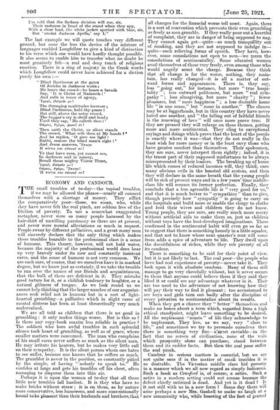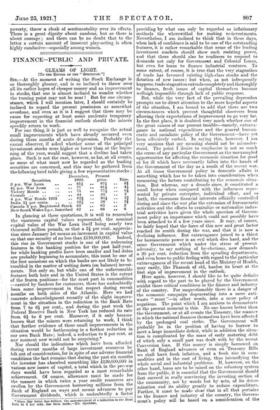ECONOMY AND CANDOUR. T HE small troubles of to-day—the topical troubles,
if we may be allowed the phrase—nearly all connect themselves with a shortage of money. They afflict the comparatively poor—those, we mean, who, while they have never felt the real pinch, are seldom free of the friction of poverty. To use a somewhat exaggerated metaphor, never were so many people harassed by the hair-shirt of unwilling parsimony as there are at present, and never were mental alleviations so much. in request. People swear by different palliatives, and a great many men will sincerely declare that the only thing which makes these troubles bearable to the professional class is a sense of humour. This theory; however, will not hold water, because the majority of the professional world does bear up very bravely under its new and constantly insistent cares, and the sense of humour is not very common. We are each sure, of course, that we ourselves.have it in marked degree, but we know just as certainly, if we take the trouble to run over the names of our friends and acquaintances, that the bulk of them are deficient in it. They mistake good nature for it, or a childish tendency to laughter, or a natural glibness of tongue. As we look round, us we cannot help thinking that the larger number of our acquaint- ances seek relief not in humour but in a sort of light- hearted grumbling—a palliative which in slight cases of mental distress has been at least theoretically very much undervalued.
We are all told as children that there is no good in grumbling : it only makes things worse. But is this so I • Is there any copy-book maxim less reliable in practice ? The soldiers who bore awful troubles in such splendid silence took heart of grumbling, as well as of grace, where smaller matters were concerned. The man who complain of his small cares never suffers as much as the silent man. He may irritate his hearers, but he makes very little call on their sympathy. It is the silent person whom one hates to see suffer, because one knows that he suffers so much. The grumbler is never in the position, so constantly pitied by the simple, of having " nobody to speak to." He confides at large and gets his troubles of his chest, often managing to disperse them into thin air. Perhaps it is upon the women of to-day that all these little new troubles fall hardest. It is they who have to make bricks without straw ; it is on them, as by nature more conservative, less humorous, and more conventionally bound to be pleasant than their husbands and brothers: that all changes for the financial worse tell most. Again, there is a sort of convention which prevents their even grumbling as freely as men grumble. If they really-pour out a heartfid of complaint, they are in danger of being supposed to nag. They cannot again get—quite—so much tranquillity out of smoking, and they are not supposed to indulge quite—such relieving forms of speech. They have, how- ever, some consolations not open to men—we mean the consolations of sentimentality. Some educated women- avail themselves of these very freely, even among those who would angrily scout the charge. Because they think that all change is for the worse, nothing, they main- tain, has really changed—it is all a matter of out- ward forms and appearances. There is, they say, less " going out," for instance, but more " true hospi- tality ; less outward politeness,. but more " real sym- pathy " ; less. almsgiving, but more " charity "'; fewer pleasures, but " more happiness " ; a less desirable home life " in one sense," but ` more in another:" The classes may be at loggerheads, but in this country they have never hated one another, and the falling out of faithful friends is the renewing of love " will once more prove true. II they are pressed they will enlarge on these themes, getting more and more sentimental-. They cling to exceptional sayings and doings which, prove that the heart of the people is exactly where it was—that they do not really in the least wish for more money or in the least envy those who have greater comfort than themselves. Their spokesmen, they are sure, never interpret them rightly ; indeed, it is the truest part of their supposed misfortunes to be always misrepresented by their leaders. The breaking up of home life which comes of reduced incomes will, they thinit, cure many obvious evils in the boasted old system, and then they will declare in the same breath that the young people will be sick of present ways and in a few years' time middle- class life will resume its former perfection. Finally, they conclude that a less agreeable life is " very good for us," and that it is much better to" sympathize " than to give, though precisely how " sympathy " is going to carry on the hospitals and build more or enable the clergy to clothe and feed their wives and children they do not know. Young people, they are sure, are really much more merry without artificial aids to make them so, just as children without toys have the best-developed imaginations. Those confirmed in the sentimental habit will even go -so far as to suggest that there is something homely in a little squalor, and that not to know where next quarter's rent will come from adds a spice of adventure to life. They dwell upon the deceitfulness of riches, while they rob poverty of all its candour.
There is something to be said for their point of view, but it is not likely to last. The real poor—the people who have had real experience of poverty—never take it. They look upon it with absolute candour. Many of them still manage to go very cheerfully without, but it never occurs to them that anyone could believe them if they said they liked it or could see any advantage whatever in it. They are too used to the adventure of not knowing how they will pay their way to find it pleasant ; too accustomed to see boys and girls turn out badly after the discipline of every privation to sentimentalize abcrat its results. When they get chance they " better themselves and make no bones about a term which, regarded from a high ethical standpoint, might leave something- to be desired. All the unpleasant "musts " of life they acknowledge to be unpleasant. They live, as- we say,. very " close to life," and sometimes we try to persuade ourselves that there is something very fine—a7nrost enviable—in the fact that no screen of civilization, none of the veils which prosperity alone can purchase, stand between them and its sadder facts. But then the real poor suffer the real pinch. Candour in serious, matters is, essential, but we are not quite sure if in the matter of small. troubles it is so desirable. The Victorian middle class hid poverty in a manner -which we all now regard as simply ludicrous. Such a book as Cranford is, of course, a satire. Such a satire in a modern setting could not amuae because the defect chiefly satirized is dead. And yet is. it dead ? Is it not still with us in a new form ? Some day there will arise perhaps a new Mrs. Gaskell: to make us laugh at a new community who, while boasting of the fact of genteel poverty, threw a cloak of sentimentality over its effects. There is a great dignity about candour, but so there is about courage; and there can be no doubt that to the latter a certain amount of innocent play-acting is often highly conducive—especially among women.



































 Previous page
Previous page